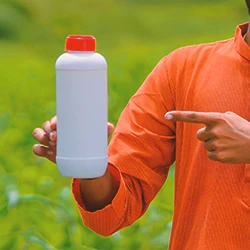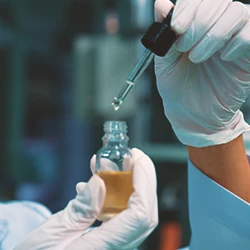You may be entitled to recover compensation and our legal team can help. Please click the button below for a Free Consultation or call us toll-free 24 hrs/day for legal advice by dialing (866) 588-0600.
Roundup QuickPro contains 73.3% glyphosate—the highest concentration available and linked to serious health risks, including cancer.
Learn about dangerous exposure levels, safer alternatives, and legal options if you’ve been affected.
Weed killers with high percentages of non-selective herbicides, such as glyphosate, are extremely effective at eliminating unwanted plants.
However, this effectiveness comes with significant risks. Glyphosate, the main ingredient in products like Roundup, has been associated with numerous health issues, including cancer and other serious conditions.
Exposure to products with high glyphosate concentrations, such as Roundup QuickPro, has led to severe health complications for many users.
If you believe Roundup has impacted your health and are seeking legal representation from a trusted law firm like Schmidt & Clark, LLP, read on to explore your options and next steps.
Table Of Contents
- Quick Summary
- What Weed Killer Has the Highest Concentration of Glyphosate?
- What Weed Killer Do Professionals Use?
- What Is the Difference Between Roundup and Glyphosate?
- What Is Glyphosate Being Replaced With?
- Glyphosate Side Effects
- Reason for the Recall
- What Is the Burden of Proof During a Roundup Claim?
- Glyphosate Exposure Lawsuits: What You Need to Know
- FAQs
- 1. What is the strongest weed killer on the market?
- 2. What brands contain glyphosate?
- 3. What happens if you use too much glyphosate?
- 4. How long does glyphosate stay active in soil?
- 5. What should I do if accidentally exposed to glyphosate?
- 6. How do I document exposure for legal purposes?
- 7. What medical tests should I request?
- 8. How do I safely dispose of glyphosate products?
- Get a Free Glyphosate Lawsuit Evaluation With Our Lawyers
Quick Summary
- Roundup QuickPro is the glyphosate-based product with the highest concentration of glyphosate.
- Professionals use Roundup Tough Weed Killer to kill tough and deep-rooted weeds.
- Glyphosate alternatives include diquat, pelargonic acid, glufosinate, and natural weed killers like vinegar and botanical oils.
- Studies suggest that glyphosate exposure is tightly linked to the development of different forms of cancer.
What Weed Killer Has the Highest Concentration of Glyphosate?

This herbicide has up to 73.3% of glyphosate.
Glyphosate is a non-selective and broad-spectrum herbicide used in agriculture to kill annual broadleaf weeds and grasses.
Extreme care is recommended for this product or any natural weed killer with high glyphosate percentages.
This is because weed killers like glyphosate are dangerous for humans, and extreme exposure will lead to many health problems and side effects. We will cover those shortly.
Now that we have established that, let’s go over the strongest weed killers with the most glyphosate for weed control or prevention of weed growth.
When considering herbicides, it’s important to understand their glyphosate concentrations, known health risks, common uses, warning label requirements, and reported cases or lawsuits.
Below is a comprehensive comparison table of three popular products:
- Roundup QuickPro
- Ranger Pro
- Killzall Weed
- Grass Killer
| Product Name | Glyphosate Concentration | Known Health Risks | Common Uses | Warning Label Requirements | Reported Cases/Lawsuits |
|---|---|---|---|---|---|
| Roundup QuickPro | 73.3% | Skin irritation, eye irritation, a potential link to leukemia | Non-selective weed control in industrial areas | Use protective gear; avoid contact with skin/eyes | Multiple lawsuits alleging health risks; ongoing litigation regarding cancer claims |
| Ranger Pro Herbicide | 41% | Throat/nose irritation, burns, a potential link to non-Hodgkin’s lymphoma | Broad-spectrum weed control in agriculture | Caution: Harmful if inhaled; wear a respirator | Lawsuits filed for health complications from exposure |
| Killzall Weed and Grass Killer | 41% | Nausea, diarrhea, vomiting | Residential and commercial weed control | Keep away from children and pets; use gloves | Reports of adverse health effects leading to lawsuits |
Related Article: Glyphosate Lawsuits Update
Roundup QuickPro
- Glyphosate Concentration: At 73.3%, Roundup QuickPro is one of the most potent glyphosate herbicides.
- Health Risks: Users have reported serious side effects, including skin and eye irritation, and there are ongoing concerns about its potential link to leukemia.
- Common Uses: Primarily used for non-selective weed control in industrial and non-cropland areas.
- Warning Labels: Users are advised to wear protective gear and avoid contact with skin and eyes due to its potency.
- Reported Cases/Lawsuits: Numerous lawsuits have been filed against the manufacturer for alleged health risks associated with long-term use.
Ranger Pro Herbicide
Glyphosate Concentration: Contains 41% glyphosate, making it a strong concentrate but less potent than Roundup QuickPro.
- Health Risks: Users may experience throat/nose irritation and burns; concerns about its association with non-Hodgkin’s lymphoma exist.
- Common Uses: Effective for broad-spectrum weed control in agricultural settings.
- Warning Labels: The product requires caution due to inhalation risks; users should wear a respirator when applying.
- Reported Cases/Lawsuits: Several lawsuits have been initiated due to exposure-related health complications.
Killzall Weed and Grass Killer
- Glyphosate Concentration: It also contains 41% glyphosate, which is similar to Ranger Pro.
- Health Risks: Users report nausea, diarrhea, and vomiting after exposure.
- Common Uses: Ideal for residential and commercial applications for weed control.
- Warning Labels: Strong warnings are issued regarding keeping the product away from children and pets; gloves are recommended during application.
- Reported Cases/Lawsuits: There have been reports of adverse health effects leading to legal claims against the manufacturer.
Understanding the differences between herbicides like Roundup QuickPro, Ranger Pro, and Killzall is essential for safe usage and risk management.
What Weed Killer Do Professionals Use?

Its ingredients, like bensulide, trifluralin, and dichlobenil are the most effective for killing tough and deep-rooted weeds.Not all weed killers are created equally.
That’s why professionals prefer to use any weed killer containing the following harsh chemicals to control weeds:
- Bensulide
- Trifluralin
- Dichlobenil
- Dimethyl tetrachloroterephthalate
- Simazine
- Oryzalin
According to LawnChick, these chemicals, or active compounds, are the best for killing tough weeds and grass before they germinate [1].
However, professionals who apply a product like Roundup to kill weeds are also exposed to the dangerous side of its ingredients.
These chemical compounds and glyphosate have been shown to be detrimental to human health.
What Is the Difference Between Roundup and Glyphosate?

Monsanto, a Missouri-based company, originally developed Roundup.
In 2018, Bayer acquired Monsanto and, therefore, inherited Roundup.
So, Roundup is the first glyphosate-based weed killer, which is why people refer to them as the same thing.
That being said, both glyphosate and Roundup are used in agricultural industries to kill weeds.
According to the National Institute of Environmental Health Sciences 2023 research, using glyphosate without adding any chemicals kills everything it is sprayed on [2].
This is what the term non-selective herbicide means. That’s why glyphosate is mixed with other chemicals to destroy plants and not everything else around them specifically.
What Is Glyphosate Being Replaced With?
Glyphosate is being replaced with non-selective herbicides such as pelargonic acid, diquat, glufosinate, and natural weed killers like botanical oils and vinegar.
According to a 2018 research by NC State University, all these alternative herbicides and selective weed killers have a contact-type activity, meaning they don’t translocate to the plant’s roots of existing weeds [3].
Each can control seedling annual broadleaf weeds if the labeled dose is properly applied.
In addition, it is essential to mention that none of these products has a residual activity in soils.
This is important since glyphosate is not a selective weed killer, meaning its chemicals remain in the ground, further contaminating our food, not simply eliminating weeds.
Glyphosate Side Effects

Immediate/Short-term Side Effects
These symptoms typically occur shortly after exposure to glyphosate or glyphosate-containing products:
- Skin Irritation: Redness, itching, or rash on contact.
- Eye Irritation: Burning sensation, redness, and watering of the eyes.
- Throat/Nose Irritation: Sore throat, coughing, or nasal discomfort.
- Burns in the Throat/Mouth: Chemical burns from ingestion or inhalation.
- Increased Saliva: Excessive drooling or salivation.
- Nausea: Feeling sick to the stomach shortly after exposure.
- Diarrhea: Loose stools that may occur within hours of exposure.
- Vomiting: Expulsion of stomach contents, often associated with nausea.
Long-term Side Effects
Chronic exposure to glyphosate has been linked to several serious health conditions:
- Leukemia: A type of cancer that affects blood cells and bone marrow.
- Non-Hodgkin’s Lymphoma: A cancer that originates in the lymphatic system.
- B-cell Lymphoma: A subtype of non-Hodgkin’s lymphoma associated with glyphosate exposure.
- Multiple Myeloma: A cancer affecting plasma cells in the bone marrow.
- Kidney Cancer: Increased risk due to prolonged exposure to glyphosate.
- Bone Cancer: Potentially linked to long-term contact with glyphosate products.
- Pancreatic Islet Cell Tumors: Associated with chronic glyphosate exposure.
- Skin Tumors: Increased risk of developing skin cancers.
The severity and type of symptoms can vary depending on how individuals are exposed to glyphosate:
- Inhalation: Breathing in aerosolized glyphosate can lead to respiratory issues and throat irritation.
- Skin Contact: Direct contact with glyphosate products can cause skin irritation and burns.
- Ingestion: Consuming food contaminated with glyphosate can result in gastrointestinal symptoms like nausea and vomiting.
Risk Factors
Certain factors can increase the likelihood and severity of side effects from glyphosate exposure:
- Frequency of Use: Regular use of glyphosate-containing products increases cumulative exposure and associated health risks.
- Concentration of Glyphosate: Higher concentrations (e.g., products like Roundup QuickPro at 73.3%) pose greater risks for severe side effects than lower concentrations.
The primary reason glyphosate is bad for human health is its formulant content. The most dangerous formulant is POEA, a petroleum-based oxidized molecule.
According to a 2023 study by the NIH, scientists concluded that exposing human cells to the components of glyphosate formulations is toxic and harmful to human health [5].
Also, in the same study, scientists identified heavy metals such as chromium, arsenic, and cobalt, which are toxic to humans and their endocrine systems.
See all related toxic tort lawsuits our lawyers covered so far.
Does Glyphosate Cause Cancer?

This is because exposing yourself to glyphosate-based herbicides or glyphosate residues increases the risk of developing non-Hodgkin lymphoma.
Both the U.S. Environmental Protection Agency (EPA) and The European Food Safety Authority agree that there is no sufficient evidence to support the claim that glyphosate residues cause cancer in humans.
Also, the European Chemicals Agency (ECHA) approved glyphosate use until 15 December 2022.
However, The World Health Organization’s (WHO) International Agency for Research on Cancer disagrees.
According to Science Direct, In 2015, they stated that a weed killer like glyphosate is probably a human carcinogen.
In 2019, researchers from The University of Washington concluded that glyphosate use increases the risk of non-Hodgkin lymphoma by more than 40% [6].
Reason for the Recall
The main reason to initiate a glyphosate recall is that it is bad for human health and linked to cancer. One of the most popular weed killers, Roundup, contains large percentages of glyphosate.
Roundup and glyphosate have been linked to cancer types such as:
- Chronic lymphocytic leukemia
- Non-Hodgkin lymphoma (NHL)
- Multiple myeloma
Over a thousand Roundup lawsuits have been filed against Bayer, a German pharmaceutical and biotechnology company.
Lawsuits against Bayer tried to prove a connection between the exposure of Roundup and the development of the NHL.
In addition, a large corpus of studies in the last 8 years has shown that high exposure to glyphosate increases the risk of developing different forms of cancer.
What Is the Burden of Proof During a Roundup Claim?

Glyphosate may be responsible for your illness or a loved one’s death due to the failure to warn customers of a known risk.
To hold a Roundup company liable for your damages, you must gather sufficient evidence to prove three key elements:
1. Defective Product
You must demonstrate that the Roundup product you used contained a defect. This could include:
- Design Defect: Issues in the product’s formulation that make it inherently unsafe.
- Manufacturing Defect: Errors during production that rendered the product dangerous.
- Marketing Defect: Inadequate warnings or failure to disclose potential risks.
Proper warnings about the product’s potential effects should be visible on the container. If such warnings were absent or insufficient, this strengthens your case.
2. Causation
You must prove that Roundup was the primary cause of your injury or illness. Evidence may include:
- Medical Records: Documenting your diagnosis and linking it to glyphosate exposure.
- Usage Records: Proof of when and how you used Roundup.
- Expert Testimony: Medical or scientific experts who can establish a causal link between Roundup and your health complications.
Establishing causation is critical for showing that the defective product directly led to your condition.
3. Damages
You must provide evidence of compensable damages caused by Roundup use. Examples include:
- Medical Bills: Costs of diagnosis, treatment, and ongoing care.
- Lost Wages: Proof of income lost due to illness or injury.
- Wrongful Death Evidence: Documentation of losses incurred if a loved one passed away due to Roundup-related health issues.
An attorney can help you identify qualifying damages and gather the necessary evidence to support your claim.
FAQs
1. What is the strongest weed killer on the market?
The strongest weed killer on the market is Roundup QuickPro. It contains as much as 73.3% of glyphosate in the form of an ammonium salt.
2. What brands contain glyphosate?
Brands that contain glyphosate are Roundup, Herbicide, Rodeo Aquatic, and Eraser.
3. What happens if you use too much glyphosate?
If you use too much glyphosate, you may cause skin or eye irritation. Some people might experience irritation in their throat and nose.
Get a Free Glyphosate Lawsuit Evaluation With Our Lawyers
Roundup QuickPro is the weed killer with the highest concentration of glyphosate. Exposure to this product can lead to side effects such as skin and eye irritations, diarrhea, nausea, and even cancer.
If you experienced such side effects, there is still time to settle a Roundup lawsuit if the case meets certain criteria. Our Roundup lawyers can help.
At Schmidt & Clark, LLP, our services include:
- Free, confidential consultations to evaluate your case
- No upfront costs or fees for our legal representation
- Payment only if we win your case or reach a settlement
References
- https://lawnchick.com/what-do-lawn-companies-use-to-kill-weeds/
- https://ntp.niehs.nih.gov/whatwestudy/topics/glyphosate/index.html
- https://content.ces.ncsu.edu/are-there-alternatives-to-glyphosate-for-weed-control-in-landscapes
- http://npic.orst.edu/factsheets/glyphogen.html
- https://pubmed.ncbi.nlm.nih.gov/29321978/
- https://www.sciencedirect.com/science/article/abs/pii/S1383574218300887

 Published by
Published by  Glyphosate Concentration: Contains 41% glyphosate, making it a strong concentrate but less potent than Roundup QuickPro.
Glyphosate Concentration: Contains 41% glyphosate, making it a strong concentrate but less potent than Roundup QuickPro.